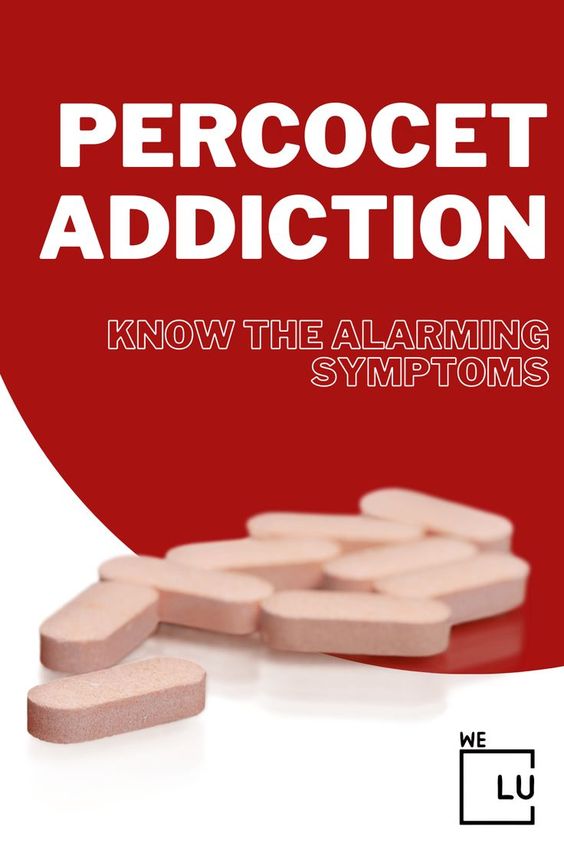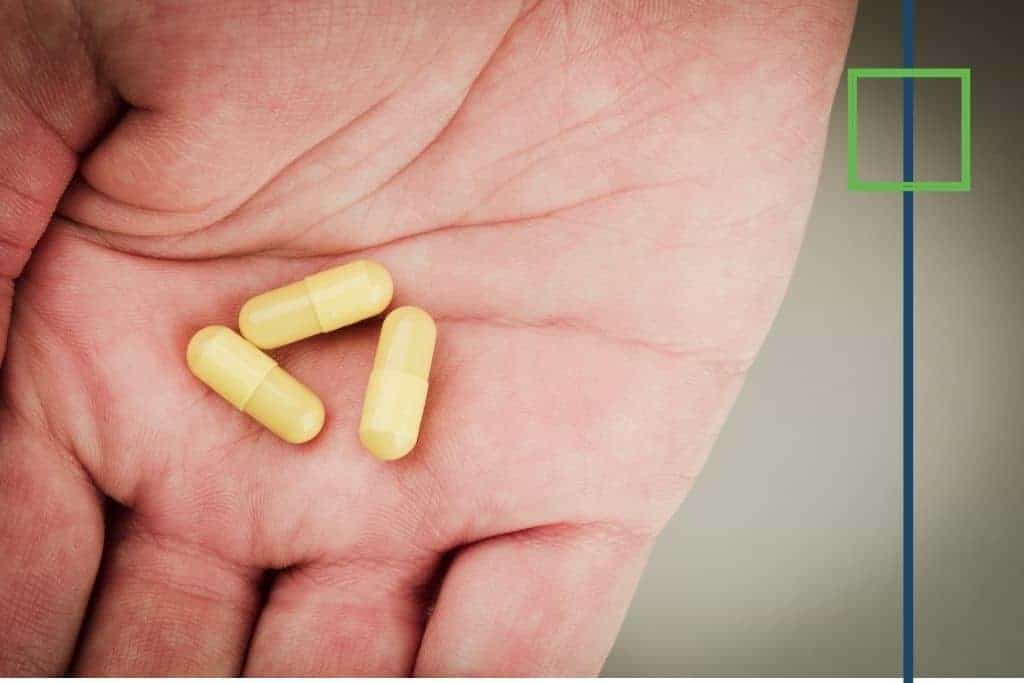By We Level Up | Editor Yamilla Francese | Clinically Reviewed By Lauren Barry, LMFT, MCAP, QS, Director of Quality Assurance | Editorial Policy | Research Policy | Last Updated: September 1, 2023
Is Percocet Addictive?
Percocet is a prescription drug that’s used to treat moderate to severe pain, and it includes both the opioid oxycodone, as well as acetaminophen. This combination is highly effective in treating physical pain. Percocet is often prescribed for people who have acute pain, such as from a surgical operation. Percocet is a controlled substance in the U.S., which means you must have a prescription to legally obtain it. Strict guidelines regulate how Percocet can be prescribed.
Is Percocet addictive? Yes, Taking Percocet or any opioid profoundly affects your brain chemistry. Taking it within about thirty minutes or so reaches your brain and binds to your opioid receptors. When that happens, your brain triggers a flood of endorphins responsible for making you feel good, as if you can no longer feel pain or euphoria.
Your body releases endorphins naturally without opioids, but not nearly as much as when you take opioids. Opioids like Percocet affect the brain’s reward center, so if you’re under the influence of opioids, you may feel euphoria, pleasure, and relaxation.
Even after taking Percocet only a few times, your brain may start to think it needs to seek more of the drug to replicate the positive experience of the high. This pattern is how addiction begins. Your brain can almost immediately push you into seeking more of the drug. As you continue using Percocet, your body becomes used to the flood of endorphins that Percocet triggers. Your system no longer sees it as an out-of-the-ordinary experience; an abnormally high level of endorphins becomes your brain’s new normal.

Get Your Life Back
Find Hope & Recovery. Get Safe Comfortable Detox, Addiction Rehab & Dual Diagnosis High-Quality Care.
Hotline(844) 597-1011Percocet Addiction Signs and Symptoms
Percocet abuse signs and symptoms will vary among people based on the length of time the person has been misusing the prescription drug, the amount of the drugs taken, and other drugs combined with Percocet. The most common Percocet abuse signs and symptoms include:
Psychological Symptoms
- Delirium
- Hallucinations
- Memory loss
- Periods of “blacking out”
- Paranoia
- Other substance abuse
- Worsening of mental health disorders
Mood Symptoms
- Rapture
- Irritation
- Sense of emotional well-being
- Feeling carefree
- Anxiety
- Depression
- Irritation
- Nervousness
Physical Symptoms
- Fatigue
- Dry mouth
- Decreased respiration rate
- Stomach pain
- Damage to vital organs
- Constriction of pupils
- Coma
- Seizures
- Failure of vital organs
- Impotence
- Lightheadedness
- Dizziness
- Constipation
- Nausea and vomiting
- Diarrhea

Behavioral Symptoms
- Agitation
- Violence
- Frequent trips to the emergency room for various pain complaints
- Faking illnesses to receive Percocet prescription
- “Doctor shopping” or going to multiple doctors to obtain greater quantities of Percocet
- Polydrug abuse
- Forging prescriptions for Percocet
- Withdrawing socially from friends and loved ones
- Cessation of once-pleasurable activities
- Long shirts in the summer to cover track marks
- Buying Percocet on the internet
- Robberies
- Loss of appetite
Get Help. Get Better. Get Your Life Back.
Searching for Accredited Drug and Alcohol Rehab Centers Near You?
Even if you have failed previously and relapsed, or are in the middle of a difficult crisis, we stand ready to support you. Our trusted behavioral health specialists will not give up on you. When you feel ready or just want someone to speak to about therapy alternatives to change your life call us. Even if we cannot assist you, we will lead you to wherever you can get support. There is no obligation. Call our hotline today.
(844) 597-1011Percocet Addiction Statistics
The following are some of the most important things to know about not only Percocet specifically, but also the opioid epidemic in the United States:
- The Department of Health and Human Services declared a public health emergency for the opioid epidemic in 2017
- There are an estimated 115 people that die in the United States from opioid overdoses every day—this includes not only prescription opioids but also heroin and synthetic opioids like fentanyl
- Anywhere from 21 to 29 percent of people prescribed an opioid for chronic pain misuse them
- It’s believed that an estimated 80 percent of people who use heroin started by abusing prescription opioids first
- Opioid overdoses went up 30 percent from July 2016 to September 2017 in 52 areas throughout 45 states in the U.S.
- Oxycodone, which is the active ingredient in Percocet, is among the top three opioids in the U.S. that have led to the most overdoses and deaths
- In 2011 there were an estimated 32 million prescriptions written for Percocet
- The United States Department of Justice reports that more than 13 million Americans abuse oxycodone

Effects of Percocet Addiction
Individuals may seek to enhance the drug’s pleasurable effects by using the drug for longer than prescribed, taking more Percocet than prescribed, or using it in non-prescribed ways, such as crushing the pills and then snorting or injecting the powder. All of these methods of administration increase the risk of Percocet addiction.
Over time, users need more and more of the drug to achieve the same pleasurable effects once achieved at much lower doses (also known as tolerance). Incremental dosage increases place users at risk of psychological and physiological dependence. Users may begin to spend increasing amounts of time obtaining the drug, using it, and recovering from its effects. They may continue to use despite negative consequences to their health, relationships, or finances.
Due to the Oxycodone in Percocet, there are numerous potential Percocet side effects tied to abuse of the drug. The most commonly recorded physical Percocet side effects include:
- Anxiety
- Fatigue
- Diarrhea
- Abdominal pain
- Headache
- Memory loss
- Dizziness
Potentially serious and more dangerous Percocet effects include:
- Liver toxicity
- Risk of infectious disease like HIV (if injected)
- Respiratory depression (slowed breathing)
- Overdose
- Death
First-class Facilities & Amenities
World-class High-Quality Addiction & Mental Health Rehabilitation Treatment
Rehab Centers TourRenowned Addiction Centers. Serene Private Facilities. Inpatient rehab programs vary.
Addiction Helpline(844) 597-1011Proven recovery success experience, backed by a Team w/ History of:
15+
Years of Unified Experience
100s
5-Star Reviews Across Our Centers
10K
Recovery Success Stories Across Our Network
- Low Patient to Therapist Ratio
- Onsite Medical Detox Center
- Comprehensive Dual-Diagnosis Treatment
- Complimentary Family & Alumni Programs
- Coaching, Recovery & Personal Development Events
Risks and Dangers of Percocet Addiction
Overdose
When Percocet is not taken properly, dangerous effects can occur. One of the most obvious effects is that of a Percocet overdose. Addicts may take between 20 and 40 tablets daily, causing confusion and a risk of overdosing. If the individual does not seek medical attention, the overdose could cause brain damage or death.
Combining Drugs
Some users who desire stronger effects may take other drugs such as alcohol or benzodiazepines with Percocet. This can cause further risks and complications, including overdose, unconsciousness, and death.

Accidents
Being under the influence of Percocet can cause the user to have various cognitive impairments, making driving or working difficult. Abusing the medication means that the user may be like this for a long period; therefore, they are putting themselves and others at risk for accidents and injuries.
Organ Damage
Additional dangerous effects of Percocet abuse and addiction include damage to organs in the body. Percocet abuse can ‘hide’ the symptoms of head injuries and cause those with heart problems to suffer cardiac distress. When Percocet is abused, acetaminophen, one of the active ingredients, can cause serious, even permanent damage to the liver.
Endocrine Damage
A Percocet addiction can lead to problems with the endocrine system. Therefore, men can develop testicular atrophy, while women can develop amenorrhea. This happens because the natural chemicals that help the hypothalamus function have been suppressed during the abuse.
Percocet Withdrawal
Anyone addicted to Percocet or any other opioid should consult a medical professional before attempting to quit, as withdrawal symptoms can be extremely unpleasant, and cravings can be intense. Addiction treatment centers may gradually wean a client off the medication or substitute an opioid dependence treatment medication to minimize these effects.
Percocet withdrawal symptoms include:
- Yawning
- Watery eyes
- Runny nose
- Restlessness
- Irritability
- Anxiety and depression
- Tremors
- Nausea and vomiting
- Diarrhea
- Hypertension
- Increased heart rate
- Muscle aches
Percocet Detox
Home detox can be dangerous because of complications that de-stabilize physical and psychiatric conditions quickly and severely. Abrupt discontinuation has caused seizures, convulsions, and coma. Additionally, usual symptoms are exceedingly uncomfortable and withdrawal is often ‘self-medicated’ by resuming use. Without adequate medical supervision, acute withdrawal symptoms may continue for some days and result in:
- Malnourishment
- Severe dehydration
- Extended hypertensive crisis
Medical assistance is recommended for Percocet withdrawal due to physical and psychiatric health risks. The most common medical method is a gradual lowering (tapering) of the usual dose as medications ease withdrawal symptoms. This process can last up to 2 weeks, depending upon one’s health, the amount of Percocet used, and how long it was used.
World-class, Accredited, 5-Star Reviewed, Effective Addiction & Mental Health Programs. Complete Behavioral Health Inpatient Rehab, Detox plus Co-occuring Disorders Therapy.
CALL(844) 597-1011End the Addiction Pain. End the Emotional Rollercoaster. Get Your Life Back. Start Drug, Alcohol & Dual Diagnosis Mental Health Treatment Now. Get Free No-obligation Guidance by Substance Abuse Specialists Who Understand Addiction & Mental Health Recovery & Know How to Help.
Percocet Addiction Treatment
First and foremost, if you think that a loved one is showing Percocet addiction symptoms, you should first research the drug and associated addiction to better understand what your loved one needs. Next, you must plan an intervention to provide your loved ones with options to battle their addiction in a safe and supportive environment. During this intervention, make sure that you offer compassion and support instead of judgment. Lastly, offer your support throughout the entire treatment process.
In addition, prolonged Percocet use can have severe physical and psychological effects, so seeking treatment as soon as possible is essential. Inpatient drug rehab offers intensive care that can help you promptly get through the early stages of withdrawal.
Medically-Assisted Detox
Detox is often considered the first stage of treatment. It will help you navigate the complicated withdrawal process, but it doesn’t address patterns of thought and behavior that contribute to drug use. Various treatment approaches and settings can help provide the ongoing support necessary to maintain long-term sobriety after you complete detox.
Cravings are very common during detox and can be challenging to overcome. This often leads to relapse. Constant medical care provided during inpatient treatment helps prevent relapse. Clinicians can provide necessary medication and medical expertise to lessen cravings and the effects of withdrawals.
Psychotherapy
Several different modalities of psychotherapy have been used in the treatment of mental health disorders along with addiction, including:
- Cognitive Behavioral Therapy (CBT) – is an effective treatment that involves changing both the patterns of negative thoughts and the behavioral routines which are affecting the daily life of the depressed person for various forms of depression.
- Dialectical Behavior Therapy – is a comprehensive mental health and substance abuse treatment program whose ultimate goal is to aid patients in their efforts to build a life worth living. The main goal of DBT is to help a person develop what is referred to as a “clear mind.”
- Person-Centered Therapy – is a strategy that allows and encourages clients to understand and resolve their concerns in a safe, supportive environment.
- Solution Focused Therapy – is an approach interested in solutions that can be quickly implemented with a simple first step leading to further positive consequences.
Dual Diagnosis Treatment
Drug abuse and mental health disorders often co-occur. In many cases, traumatic experiences can result in a mental health disorder and substance abuse. Dual diagnosis rehabilitation treats both of these issues together. The best approach for the treatment of dual diagnosis is an integrated system. This strategy treats both the substance abuse problem and the mental disorder simultaneously. Regardless of which diagnosis (mental health or substance abuse problem) came first, long-term recovery will depend largely on the treatment for both disorders done by the same team or provider.
Medication-Assisted Treatments
Medication-Assisted Treatments (MAT) for substance use and mental health disorders are commonly used in conjunction with one another. This includes the use of medications and other medical procedures. During your rehab, the staff from your treatment facility will help you identify what caused your addiction and teach you skills that will help you change your behavior patterns and challenge the negative thoughts that led to your addiction. Sometimes, the pressures and problems in your life lead you to rely on substances to help you forget about them momentarily.
Now that we’ve answered the question “how long is Percocet stay in your system?”, do not try to detox on your own. The detox process can be painful and difficult without medical assistance. However, getting through the detox process is crucial for continued treatment. We Level Up provide proper care with round-the-clock medical staff to medically assist your recovery. So, reclaim your life, and call us to speak with one of our treatment specialists. Our counselors know what you are going through and will answer any of your questions.

Experience Transformative Recovery at We Level Up Treatment Centers.
See our authentic success stories. Get inspired. Get the help you deserve.
Start a New Life
Begin with a free call to an addiction & behavioral health treatment advisor. Learn more about our dual-diagnosis programs. The We Level Up Treatment Center Network delivers recovery programs that vary by each treatment facility. Call to learn more.
- Personalized Care
- Caring Accountable Staff
- World-class Amenities
- Licensed & Accredited
- Renowned w/ 100s 5-Star Reviews
We’ll Call You
Sources:
[1] NIH – https://medlineplus.gov/druginfo/meds/a682132.html
[2] DEA – https://www.deadiversion.usdoj.gov/schedules/
[3] FDA – https://www.hhs.gov/sites/default/files/pmtf-final-report-2019-05-23.pdf
[4] Percocet Side Effects – We Level Up NJ


